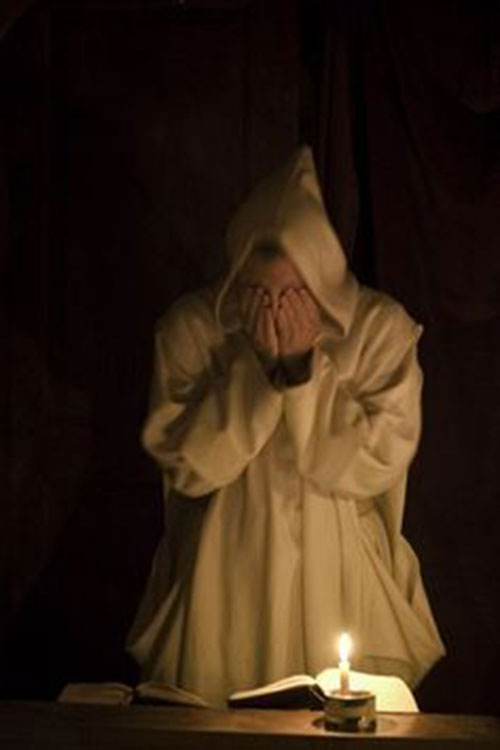
Carthusians live alone together. They have a lot to teach us – even more in these times of Covid-19. This post explores one of their spiritual practices that may enrich those unable to participate in the Eucharist at this time because of lockdowns, quarantines, and isolation.
Anyone who knows me, and those who have been part of the community around this site for a while – and poked around its possibilities – will know my treasuring of the monastic traditions, and my conviction about how much monasticism has to teach us beyond cloister walls. Especially Carthusians.
Carthusians live as a community of hermits. Each hermit has the equivalent of a small townhouse. They live alone together.
Carthusians continue a long-established practice called Officium Missæ or the ‘Office of the Mass’. This tradition may be a helpful spiritual practice for people in isolation, lockdown, or at other times. The practice is also referred to as Missa Sicca or the ‘Dry Mass’. In essence, it is taking parts of the usual Eucharistic Liturgy, but without the elements of bread and wine. In the Middle Ages, Missa Sicca was regularly prayed after Mass. It can, hence, be understood as an extension, a meditation on the depth of the familiar Eucharistic Liturgy. What I am suggesting, then, is that some people might find it spiritually enriching to slowly, meditatively, prayerfully read their way through the Eucharistic Liturgy – readings and all. Carthusians, normally, pray this alone following Prime or Terce (basically, for us, that would be as part of our morning prayer).
I think there is a slightly different dynamic to Spiritual Communion, though I also think there is obviously overlap. Spiritual Communion focuses on receiving the grace of the union with Christ given by receiving Holy Communion; the Office of the Mass is a meditative praying of the prayers of the Liturgy of the Eucharist, entering more deeply, fully, and consciously into those prayers.
Carthusians pray one of the Hours of the Office followed by praying the Hour from the Little Office of the Blessed Virgin Mary. Then, after Prime (the First Hour – 7am) or Terce (the Third Hour – 9am) the Office of the Mass is prayed.
Here is the Carthusian Office of the Mass
Here is the fuller Carthusian Office of the Blessed Virgin Mary
Here is an online version of the Carthusian Office of the Mass
If you are wanting to follow the Carthusian Office of the Mass as a template:
Lord, have mercy.
Christ, have mercy.
Lord, have mercy.Gloria [omitted in Lent and Advent]
Collect of the Day [you can use the Collect for the Week]
The Readings set for the Eucharist. These are found:
Daily Eucharistic Lectionary (NRSV) and here
Daily Eucharistic Lectionary (Jerusalem Bible)
Daily Eucharistic Lectionary
and here and here
You might need to go to the next day in some of these examples that are resourced from, say, UK or USA.Any other prayers. Do also look at the resources for Spiritual Communion.
Let me stress, yet again: we have had a long period of necessary renewal of the Eucharist amongst Christians so that now it is the norm to celebrate ‘the Lord’s own service with the Lord’s own people on the Lord’s own day’. This is a good thing. BUT, I contend (and have long done so) that the weekly one hour of the Holy Eucharist has been asked to be bear the full weight of Christian life including teaching, prayer, and fellowship – a weight that it was never meant to bear. It seems to me that our current context may be an invitation by God to renew Daily Prayer (the Daily Office) – Spiritual Communion and adapting the Carthusian Office of the Mass may be of value, but let us take care that this is not simply a way of sidestepping God’s call to us to take up the work of Daily Prayer. I may yet write more on this in the future. I also may produce a further reflection(s) about what (particularly) Carthusians can teach us in these unusual times.
Fr Chris Orczy live streams a Service of Spiritual Communion and here.
Some of the other resources on this site for these times:
Spiritual Communion
Coronavirus solitude self-isolation and spirituality
Streaming services, online spiritual resources in coronavirus times
New Zealand Prayer Book Daily Prayer
NZ in lockdown
Covid 19 moves churches into the Third Millennium
Some of the resources I appreciate off this site (please add others in the comments section):
Daily Faith Sharing with Fr. James Martin, SJ
Taizé’s daily prayer


